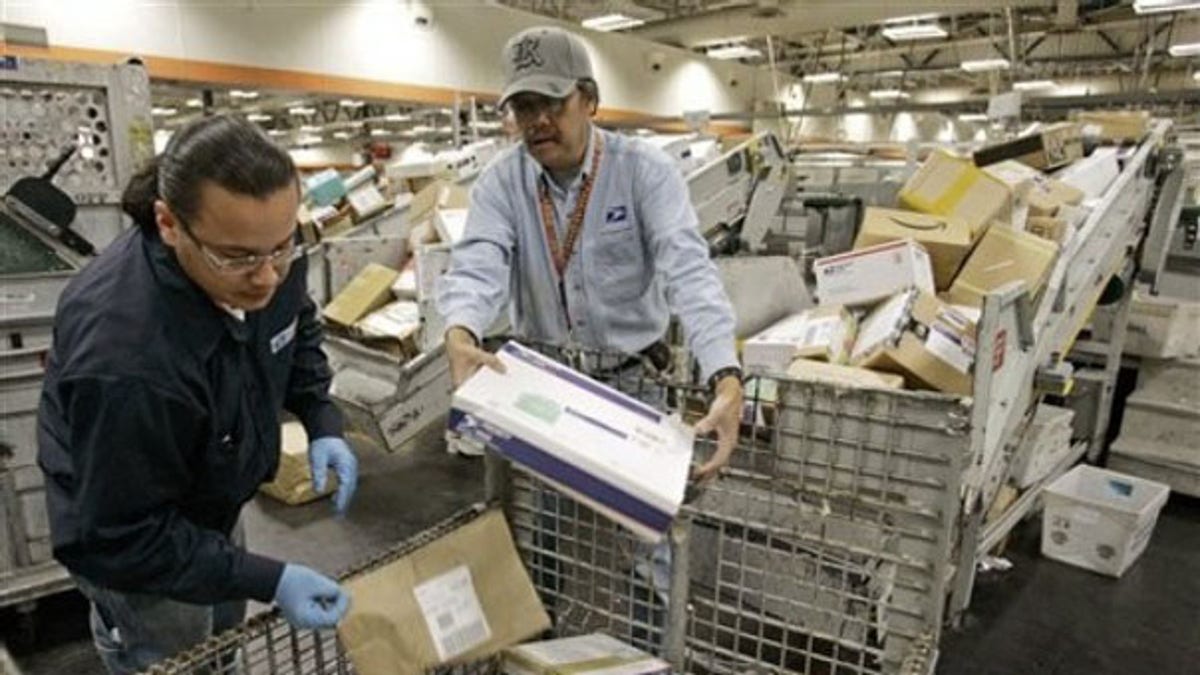
FILE: U.S. Postal Service mail handlers sort packages at the USPS San Francisco center. (AP)
Please Mr. Postman! Not another federal bailout!
That’s one of the scenarios looming on the horizon after the U.S. Postal Service released its latest financial report on Tuesday. The dismal data showed the agency lost $2.2 billion in the second quarter of fiscal year 2011 – much higher than the $1.6 billion in losses posted during the same time frame a year earlier – and may soon be unable to repay its Treasury Department loans.
“This is not going away but will get worse,” said Rick Geddes, an associate professor in policy analysis and management at Cornell University. “There is about $90 billion in unfunded liabilities. So there will be a giant taxpayer bailout in the next few years, which will dwarf the banks bailouts, since money to the USPS will never be paid back. It’s all totally predictable, given collapsing revenue.”
To be sure, the Postal Service faces increased competition from email, the Internet, FedEx and UPS. Total mail volume declined during the January to March period, by about 3 percent when compared to the same period in the previous fiscal year, to 41 million pieces. That decline drove the corresponding decline in revenue.
“It's nothing new for the Postal Service,” said James Gattuso, a senior research fellow at the Heritage Foundation. “It's a long-term decline, basically because they find themselves on the wrong end of the information revolution. The industry is changing. People's communication habits are changing. And they face a long-term question about whether mail will exist.”
Yet USPS handled roughly 170 billion pieces of mail last year, including payments mailed from people and companies worth an estimated $10 trillion – meaning hard-copy mail remains a vital element in the U.S. economy, and isn’t about to vanish.
Instead, defenders of the Postal Service cite other factors which, if addressed by the U.S. Congress – they say would wipe out USPS’ red ink and make it profitable overnight.
For one thing, they say, the USPS receives no taxpayer funding. The friendly neighborhood postman, the mail sorter at the post office, the cashier ringing up the stamp purchases – none of them are government employees. Instead, USPS and its full-time staff of 520,000 – slashed by some 20 percent over just the last three years – survives entirely on revenue derived from its sale of goods and services.
But USPS faces three statutorily mandated requirements unique to it. First, the agency is required by law to prepay $5.5 billion each year for future retiree health benefits. “No other organization in the country is required to fund at that level,” Joe Corbett, the Postal Service’s chief financial officer, told Fox News. “Government agencies do not fund, and parcel companies don't fund, anywhere near that level.
“We have already funded $43 billion into this plan…As of today, there is enough money in that fund to pay all of our existing retirees from now until the day of their death…yet we are required to continue to prefund.”
Second, USPS is required by law to deliver the mail six days a week. Eliminating Saturday deliveries, a move some polls show Americans are willing to tolerate, would save an estimated $3 billion per year.
Redressing those two situations – both of which would require congressional approval that lawmakers have thus far balked at granting – would wipe out the $7 billion in annual losses the USPS projects it will post this year.
Finally, USPS has reportedly overpaid an additional $7 billion to a federal fund, but the White House Office of Personnel Management disagrees, and the repayment of that money remains in dispute.
“That would turn what are now, again, substantial losses into substantial profits, just with those three changes alone,” Corbett said.
The Postal Service is not entirely without sympathetic ears in Congress. Sen. Susan Collins, R-Maine, has proposed legislation that would enable the agency to reduce its pension payments, among other austerity measures.
If the Postal Service does end the fiscal year on September 30 unable to repay its Treasury Department loans, it would not immediately interrupt mail service.












































